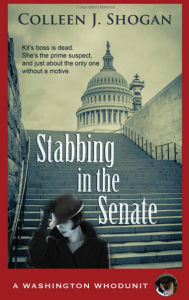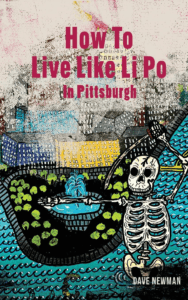We’re thrilled to be able to share with you the first chapter of Stabbing in the Senate by Colleen J. Shogan, a Pittsburgh native turned D.C. insider who will be visiting Mystery Lovers Bookshop for a Coffee and Crime discussion in December. Shogan has previously worked on Capitol Hill as a legislative staffer in the United States Senate; taught American politics at Yale, George Mason University, Georgetown, and Penn; and is currently the Deputy Director of the Congressional Research Service at the Library of Congress.
Stabbing in the Senate (“A perfect who-done-it” — Cathi Stoler, author of The Hard Way) is her first novel.
 Ascending from the underground depths of the Metro, I confronted the alabaster dome in the distance. The sight never failed to leave me awestruck, an imposing reminder of the city’s fundamental purpose. New York City has the Empire State Building, Paris the Eiffel Tower, and Washington, D.C., the Capitol Rotunda. The stillness of morning on the Hill was a rare gift. Only a few ambitious politicos beat the nine o’clock cattle call summoning over 10,000 congressional staffers to their lairs.
Ascending from the underground depths of the Metro, I confronted the alabaster dome in the distance. The sight never failed to leave me awestruck, an imposing reminder of the city’s fundamental purpose. New York City has the Empire State Building, Paris the Eiffel Tower, and Washington, D.C., the Capitol Rotunda. The stillness of morning on the Hill was a rare gift. Only a few ambitious politicos beat the nine o’clock cattle call summoning over 10,000 congressional staffers to their lairs.
A gentle breeze blew mist from Columbus Fountain across my face as I strode toward the landmark. Debilitating heat would descend in a few hours. People forget that our nation’s capital was built on a swamp. Stately monuments sit where the marshes once stood, yet the climate in July is reminiscent of the original ecosystem that thrived for thousands of years prior to the ascendancy of the political muck.
I silently congratulated myself for being early to work, atypical for me. After crossing Upper Senate Park, I arrived at the Hart Senate Office Building. The police at the staff entrance glanced at my official identification badge, and I hustled toward the elevator. I was alone in Hart’s vast marble atrium. The only other obstacle was Alexander Calder’s massive industrial fifty-foot statue of steel mountains and clouds. Unlike law firms and the military, Congress didn’t subscribe to the “early to bed, early to rise” axiom.
I exited the elevator on the sixth floor and mechanically made the left turn down the hallway. My destination was the office of Senator Lyndon Langsford, a prominent New England legislator with a recent penchant for ignoring his fellow Democratic partisans and voting his conscience. His newfound independence had staffers like me scrambling to explain his complicated politics. Reaching for the glass door, decorated with Langsford’s nameplate and the requisite state and American flags, I discovered it was locked. Muttering a few choice four-letter words, I rummaged through my purse for the office key. I couldn’t remember the last time I’d used it. I found it in a zippered pocket, stuck to an unwrapped piece of chewing gum.
[bctt tweet=”Read the first chapter of Stabbing in the Senate by @cshogan276!”]It was eerie entering the suite in silence. Our office was normally a constant buzz of activity and noise. After locating the light switch, I headed to my cubicle. Private offices were reserved for senior staffers who had toiled for countless years on Capitol Hill. My “office” was a small, semi-walled compartment with little privacy. Since I considered myself a person with few secrets, working in the open wasn’t much of a sacrifice.
Senator Langsford needed a memorandum I was supposed to have written yesterday about an Appropriations Committee hearing later in the week on the renewal of a mega defense contract. It was my job to make sure he was prepared for that hearing. Langsford was the only senator on the committee who hadn’t announced his position. So far he had refrained from public comment. He needed to read the background memo this morning so we could talk about it later in the day. I had printed it out the night before and my immediate supervisor signed off on it, but I missed the early evening deadline for getting memos to the senator prior to his departure. Most senators, Langsford included, didn’t read memos via email. The only option had been to get him the memo as early as possible this morning.
I unlocked my file cabinet drawer, deposited my purse inside, grabbed the memo from underneath a stack of papers, and headed toward his private office. I zipped by the desk of the senator’s personal assistant, situated right outside his sanctum. Even Kara, right-hand keeper of the inviolable senatorial schedule, still hadn’t made an appearance.
The senator’s office door was ajar, and I barreled forward to position my memo on the top of his “to read” pile of papers. Staffers weren’t supposed to enter the senator’s office without a reason. Kara might turn the corner any moment. If I could just slip in and out unnoticed, this memo would be the first document he read when he arrived for work.
I glanced toward the sitting area. A hand rested on the arm of a regal chair. The chair, turned away from me, faced the windows and a beautiful view of the Capitol grounds. Royal screw up. I wasn’t the only person in the office. Senator Langsford was already here! He always arrived through a private entrance, not the main door. I had infiltrated his office unannounced. There was no way I could back out of the office gracefully.
I cleared my throat and stammered awkwardly, “Senator Langsford, I’m sorry, sir. It’s Kit Marshall, Senator. I didn’t quite finish up the Appropriations hearing memo before you left last night. I wanted to put it in your inbox this morning so you could read it, and if you’d like, we could discuss it later today or whenever.”
No response. After a minute, I asked, “Would you like me to put it on your desk?” I waved the memo back and forth.
Lyndon Langsford was a suave politician who rarely missed a beat. That was why I enjoyed working for him. Nothing fazed him. Persistent protesters, disgruntled constituents, slimy lobbyists, and aggressive political reporters—he handled all with ease. In my thirty years on the planet, I wondered if I would ever manage to exude a fraction of his panache. Yet I never felt self-conscious around him. I waited for him to say something polite to let me off the hook for my transgression.
Utter silence. Was he asleep? It was an odd time for a power nap. Beads of sweat trickled down my neck, saturating the collar of my blouse. Senator Langsford was well-mannered, often to the extreme. Had he decided to give me the cold shoulder this morning? The stillness was stifling.
I could just put the memo on his desk, sidle out the door, and pretend I had never spoken. But I would not be able to work at my desk for the rest of the day, thinking Langsford was upset with me.
“Senator, I’m sorry,” I repeated. “I feel terrible for interrupting you. Should I leave the memo on your desk so you can read it?”
I’m not sure how long I stood there. A few seconds seemed like an eternity. I noticed there was no physical reaction at all to my question. That was weird. If he was irritated, his body language should have indicated annoyance. He had to be asleep.
As I approached tentatively, I noticed crimson drops of blood on the thick carpeting of his office. His head was thrown back, and two vacant eyes stared at me. Lyndon Langsford wasn’t giving me the cold shoulder. He was dead.
This chapter reprinted here courtesy of the author.

























